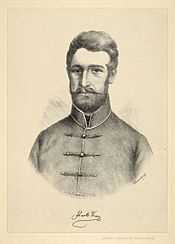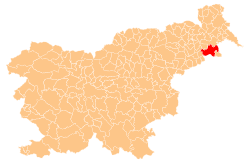Stanko Vraz

Stanko Vraz (born Jakob Frass) (30 June 1810 – 20 May 1851) was a Croatian-Slovenian poet. He Slavicized his name to Stanko Vraz in 1836.
Biography
Born in the small village of Cerovec in Lower Styria, Austrian Empire (today in Slovenia), Stanko Vraz was one of the most important figures of the Illyrian Movement in the Kingdom of Croatia and Slavonia.[1] He was the first Croatian to earn his living as a professional writer. He wrote poems and travelogues and collected folk poems. He also translated foreign literature into Croatian.
While in Samobor, he met Julijana "Ljubica" Cantilly, the niece of his friend and colleague, Ljudevit Gaj.[2] She served as his muse, and he wrote and dedicated many poems and works to her.
Works
In 1842 he and two of his other contributors founded Kolo, one of Croatia's first literary magazines.[3] The magazine, as well as his works, were influenced by national romanticism.
Regarding the Slovene language, Vraz's most notable work is the work Narodne pesmi ilirske, koje se pevaju po Štajerskoj, Kranjskoj, Koruškoj i zapadnoj strani Ugarske (Illyrian Folk Songs Sung in Styria, Carniola, Carinthia and the Western Part of Hungary). It contains folk songs and art songs in Slovene, accompanied by comments in Croatian. These songs are the first Slovene texts in Gaj's Latin Alphabet. This orthography was already used at the time by Croats and spread among Slovenes a few years later. Vraz created numerous poems in Slovene but for the most part they have never been published.
He also translated works of Lord Byron and Adam Mickiewicz.[4]
Death
Stanko Vraz died in Zagreb in 1851.
See also
- Illyrian Movement
References
- ↑ Baynes,Thomas Spencer. The Encyclopædia Britannica. Vol. 21.
- ↑ Stančić, Nikša. Gajeva "Još Horvatska ni propala" iz 1832–33: ideologija Ljudovita Gaja u pripremnom razdoblju hrvatskog narodnog preporoda. Globus, 1989.
- ↑ Kann, Robert A. A History of the Habsburg Empire, 1526–1918. Los Angeles: University of California Press, 1974.
- ↑ Kuzmič, Franc (22 March 2012). "Prevajalci Pomurja in Porabja" [The Translators of Mura Region and Raba Valley] (in Slovenian). Murska Sobota Regional Museum.
External links
| ||||||||||||||||
| ||||||||||||||||
|

